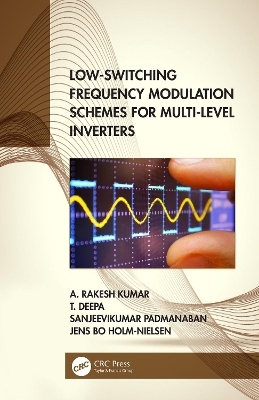
Low-Switching Frequency Modulation Schemes for Multi-level Inverters
CRC Press (Verlag)
978-0-367-55260-2 (ISBN)
Multi-level Inverters (MLIs) are widely used for conversion of DC to AC power. This book provides various low-switching frequency (LSF) modulation schemes (conventional and improved), which can be implemented on MLIs. The LSF modulation schemes are implemented to three different MLI topologies to demonstrate their working and aimed at their application to reader invented MLI topologies. Highlighting the advantages of LSF over high-switching frequency (HSF) modulation schemes, the simulations are carried out using MATLAB®/Simulink along with hardware experiments. The practical application of MLIs to renewable energy sources and electric vehicles is also provided at the end of the book. Aimed at researchers, graduate students in Electric Power Engineering, Power Electronics, this book:
Presents detailed overview of most commonly used multi-level invertor topologies.
Covers advantages of low-switching over high-switching frequency scheme.
Includes an exclusive section dedicated for an improved low-switching modulation scheme.
Dedicated chapter on application of renewable energy sources to multi-level invertors and electric vehicles.
Explains all the low-switching frequency modulation schemes.
A. Rakesh Kumar completed his B.E in Electrical and Electronics Engineering from DMI College of Engineering, Anna University, Chennai, India in 2011 and M.Tech in Power Electronics and Drives from Jerusalem College of Engineering, Anna University, Chennai, India in 2013. He is currently pursuing his Ph.D from Vellore Institute of Technology, Chennai Campus. His field of interest includes multilevel inverters, inverter modulation techniques, smart grid and its applications. He is currently with the School of Electrical Engineering, Vellore Institute of Technology, Chennai, India where he is pursuing Ph.D in the field of multilevel inverters. (E-mail:rakesh9490@gmail.com) T. Deepa is currently working as Associate Professor in School of Electrical Engineering from Vellore Institute of Technology, Chennai Campus. She completed her Ph.D from College of Engineering, Guindy, Anna University in Process Control. She completed her B.Tech in Electrical and Electronics Engineering from Manonmaniam Sundaranar University, Tirunelveli and M.Tech from College of Engineering, Guindy, Anna University in Power System. Her research interest includes process control, control systems and intelligent controllers. (E-mail:deepa.t@vit.ac.in) Sanjeevikumar Padmanaban (M’12, SM’15) received the bachelor's degree in electrical engineering from the University of Madras, India, in 2002, the master's degree (Hons.) in electrical engineering from Pondicherry University, India, in 2006, and the Ph.D. degree in electrical engineering from the University of Bologna, Italy, in 2012. He was an Associate Professor with VIT University from 2012 to 2013. In 2013, he joined the National Institute of Technology, India, as a Faculty Member. In 2014, he was invited as a visiting researcher with the Department of Electrical Engineering, Qatar University, Qatar, funded by the Qatar National Research Foundation (Government of Qatar). He continued his research activities with the Dublin Institute of Technology, Ireland, in 2014. He was an Associate Professor with the Department of Electrical and Electronics Engineering, University of Johannesburg, South Africa, from 2016 to 2018. Since 2018, he has been a Faculty Member with the Department of Energy Technology, Aalborg University, Esbjerg, Denmark. He has authored 300 plus scientific papers and has received the Best Paper cum Most Excellence Research Paper Award from IET-SEISCON’13, IET-CEAT’16 and five best paper award from ETAEERE’16 sponsored Lecture note in Electrical Engineering, Springer book series. He is a fellow Institution of Engineers (FIE’18, India), fellow Institution of Telecommunication and Electronics Engineers (FIETE’18, India) and Fellow the Institution of Engineering and Technology (FIET’19, UK). He serves as an Editor/Associate Editor/Editorial Board of refereed journal, in particular, the IEEE Systems Journal, the IEEE Access Journal, the IET Power Electronics, Journal of Power Electronics, Korea, and the subject editor of the subject Editor of IET Renewable Power Generation, the subject Editor of IET Generation, Transmission and Distribution, and the subject editor of FACTS journal, Canada. (Email: san@et.aau.dk) Jens Bo Holm-Nielsen currently works at the Department of Energy Technology, Aalborg University and Head of the Esbjerg Energy Section. On this research, activities established the Center for Bioenergy and Green Engineering in 2009 and serve as the Head of the research group. He has vast experience in the field of Bio-refinery concepts and Biogas production–Anaerobic Digestion. Implementation projects of Bio-energy systems in Denmark with provinces and European states. He served as the technical advisory for many industries in this field. He has executed many large scale European Union and United Nation projects in research aspects of Bioenergy, bio refinery processes, the full chain of biogas and Green Engineering. He has authored more than 100 scientific papers. He was a member on invitation with various capacities in the committee for over 250 various international conferences and Organizer of international conferences, workshops and training programmes in Europe, Central Asia and China. Focus areas Renewable Energy - Sustainability - Green jobs for all.
1. Introduction. 2. Low Switching Frequency Modulation Schemes. 3. Implementation of LSF Modulation Schemes on Cross-Connected Sources based MLI. 4. Implementation of LSF Modulation Schemes on Cascaded H-Bridge MLI. 5. Implementation of LSF Modulation Schemes on Multilevel. 6. Practical Implementation of MLIs in Power Conversion. 7. Bibliography. 8. Appendix A Firing Angles for the EPM Scheme. 9. Appendix B Firing Angles for the HEPM Scheme. 10. Appendix C Firing Angles for the SHE Scheme. 11. Appendix D Firing Angles for the NLM Scheme. 12. Appendix E Firing Angles for the mNLM Schemes.
| Erscheinungsdatum | 28.09.2023 |
|---|---|
| Zusatzinfo | 37 Tables, black and white; 65 Illustrations, black and white |
| Verlagsort | London |
| Sprache | englisch |
| Maße | 156 x 234 mm |
| Gewicht | 453 g |
| Themenwelt | Technik ► Elektrotechnik / Energietechnik |
| Technik ► Umwelttechnik / Biotechnologie | |
| ISBN-10 | 0-367-55260-4 / 0367552604 |
| ISBN-13 | 978-0-367-55260-2 / 9780367552602 |
| Zustand | Neuware |
| Informationen gemäß Produktsicherheitsverordnung (GPSR) | |
| Haben Sie eine Frage zum Produkt? |
aus dem Bereich


